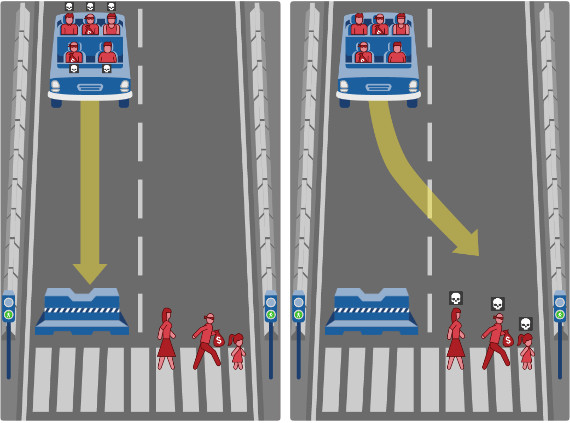
Trolley problems and autonomous vehicles: what does the public think?
Westerners are more likely to prioritise the young over the old.
The “trolley problem” is a philosophical thought-experiment that has interested ethicists for over half a century (for a brief explanation of the problem, click here).
But the issue is not a matter of mere theoretical importance: as scientists and engineers have emphasised, the prospect of introducing autonomous vehicles on our roads raises questions of how we should program such vehicles to behave should they face “trolley-style” dilemmas.
A new study led by researchers from MIT analyses data from a massive online study of people’s decisions to prioritise lives in different variations of a car-based “trolley problem”.
To gather the data, researchers from MIT designed a multilingual online game called “Moral Machine”. People from 233 countries around the world logged on to the platform, with over 40 million decisions recorded.
The researchers found noticeable differences in the attitudes towards taking and sparing different lives among participants from Western and Asian backgrounds.
In one of the scenarios, participants needed to choose whether a self-driving car should continue straight ahead to kill three elderly pedestrians or swerve into a barricade to kill three youthful passengers. According to the results, participants from Western countries were more likely to prioritise younger lives over older lives, whereas those from Asian countries showed greater concern for sparing the lives of older persons.
Another variation asked participants whether the vehicle should spare the lives of law-abiding bystanders, or, alternately, law-breaking pedestrians who might be jaywalking. Participants from poorer countries with weaker institutions were more tolerant of jaywalkers versus pedestrians who cross legally.
Other scenarios tested people’s preferences for hitting homeless persons or doctors and executives. Participants from countries with a high level of economic inequality show greater gaps between the treatment of individuals with high and low social status.
Researchers say the survey offered a simple way for the public to contribute to ethical debates about self-driving cars, and that it provides valuable insights into which factors people think are important for autonomous cars to use in resolving ethical tradeoffs.
Yet some are critical of the attempt to introduce factors such as age and gender into deciding how the car should act. Last year the German transport ministry, adopting the recommendations of a 14-member ethics commission, prohibited using gender or age to resolve trolley dilemmas.
Trolley problems and autonomous vehicles: what dos the public think?
Creative commons
https://www.bioedge.org/images/2008images/Couv-9.jpg
autonomous vehicles
consequentialism
deontology
practical ethics
